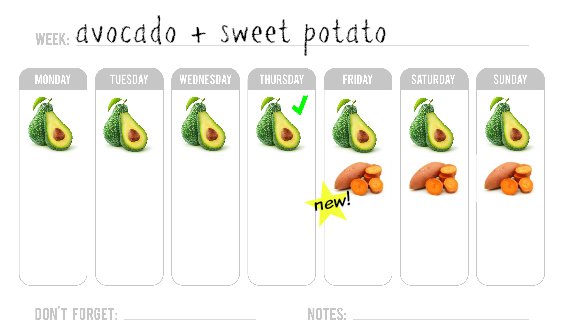Images: Shutterstock
What is the “4 Day Wait Rule”? Is it important to follow the “4 Day Wait Rule” when starting solid foods?
The “4 Day Wait Rule” is a really simple way to check for possible reactions to new foods such as food sensitivities or food allergies. Remember that in addition to possible allergic reactions, foods can also cause digestive troubles like tummy pains, painful gas or even poop troubles. Introduce new foods, one food at a time and at a space of 4 days apart.
For example, introduce baby to avocado on Monday and then wait until Friday to introduce another food.
When you introduce a new food over the course of several days, you are better able to determine exactly how your baby is reacting to that food. It is important to follow the “four day wait” rule when introducing your baby to new solid foods, especially in the beginning stage. This is most important if you and/or your family members have a history of food allergies.
Following the four day wait rule and introducing new foods one at a time will also enable you to easily begin an “elimination diet“. If you suspect your infant has had an adverse reaction to a new food, you will have just a few foods to look to as the culprit.
Is the 4 day wait rule really necessary? Have you been told to abide by or toss it out the window along with other “old wives tales”?
As studies are now showing that waiting to introduce allergenic foods might not have any impact on whether a child develops a food allergy, the use of the 4 day wait rule is becoming obsolete and outdated.
There are many pediatricians who are now suggesting that babies may be introduced to a variety of foods, all at once, even during the first days of introducing solid foods.
The thought is that offering a wider variety of tastes and textures, early and often, will get baby’s tastebuds excited and “trained” to enjoy flavors of all types. Offering a larger variety sooner, such as serving 4 new foods during a 2 or 4 day span, rather than later may just give baby the willingness and curiosity to try anything and everything put in front of him. And don’t forget the herbs and spices when introducing solid foods, earlier is better it is being said!
(from the WBF Blog 07 March 2011)
The ” 4 day wait rule” might be a good practice to follow if you have a history of food allergies
Following a slow pattern of introducing solid foods to your baby will help pinpoint allergic reactions and to pinpoint any digestive issues a new food may cause. Allergic reactions typically will occur within the first 24 hours. Digestive issues with new foods(like diarrhea or constipation) may take longer to appear.
Introduce new foods during the morning or early afternoon.
This will enable you to deal with any adverse reactions when your pediatrician is in office. Should an adverse reaction occur during the morning/early afternoon, it will cause the least amount of disruption in baby’s fragile routine.
When Can I Mix Foods Without Worrying About the 4 Day Wait Rule?
Once you have introduced several new foods without a reaction, you can then begin to mix them together as you wish.
When Can I Stop Paying Attention to the 4 Day Wait Rule?
When your baby is around 9-10 months of age, you will have introduced many new foods and will have a good idea about what foods may be allergenic or cause your little one digestive upsets. At this stage, paying less attention to the 4 day wait rule is common. As you loosen up the 4 day wait rule, it is still important to pay attention to the new foods you offer your little one, especially those foods that do pose an allergy risk. Of course if your family has a history of food allergies and/or intolerances, you may want to continue to follow the 4 day wait rule until your baby is at least 12 months of age. As always, you should consult with your baby’s pediatrician.
Read More About Baby Food And Baby Allergies
- Allergy and Allergen Information
- Forbidden Baby Foods
- Soy and Soy Allergies
- Wheat and Gluten and Baby Food
- Lactose Intolerance
- Allergy Elimination Diet Page
- Eggs – When to Introduce Eggs
Always consult with your pediatrician regarding introducing solid foods to your baby and specifically discuss any foods that may pose allergy risks for your baby.


